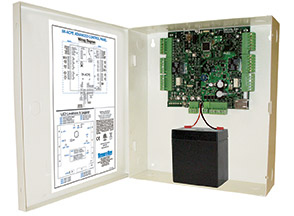
Secura Key Launches 2 Door Access Control Panel with Ethernet
Secura Key is proud to announce the launch of the SK-ACPE-LE, 2-Door, access control panel. This is a major upgrade to Secura Key’s legendary SK-ACP-LE control panel. The redesign was driven by the ACP’s 16-bit Hitachi main processor unit becoming obsolete, but it has allowed some major improvements to be made possible by the  powerful new ARM Cortex M3, 32-bit RISC processor.
powerful new ARM Cortex M3, 32-bit RISC processor.
The main improvement is the addition of an Ethernet interface. The unit can be plugged into any hub or router using CAT 5e or CAT 6 cables with RJ45 connectors. This eliminates the requirement for a separate plug-in Ethernet module. More status LEDs have been added to the board to provide better feedback during installation and service. On-board memory has been increased, allowing up to 10,000 stored transactions and up to 65,000 limited-use cards. The panel now includes an enclosure tamper input that can be connected to an optional enclosure tamper switch.
The SK-ACPE-LE’s RS-485 communications lines are hardened with gas discharge, tube surge suppression. It boasts a 3-Amp, heavy-duty power supply with power line noise immunity, and it continually monitors backup battery status. Communications speeds and transaction storage capacity have more than doubled over the previous model. The ARM platform will enable future enhancements and system upgrades.
Due to the large number of legacy systems in the field, Secura Key has designed the SK-ACPE as a drop-in replacement for the SK-ACP. The SK-ACPE is almost functionally identical in a retrofit/replacement scenario, and it will work with older versions of SK-NET software. Connectors and their functions are identical to the SK-ACP. An older board can be easily replaced without rewiring the connectors.